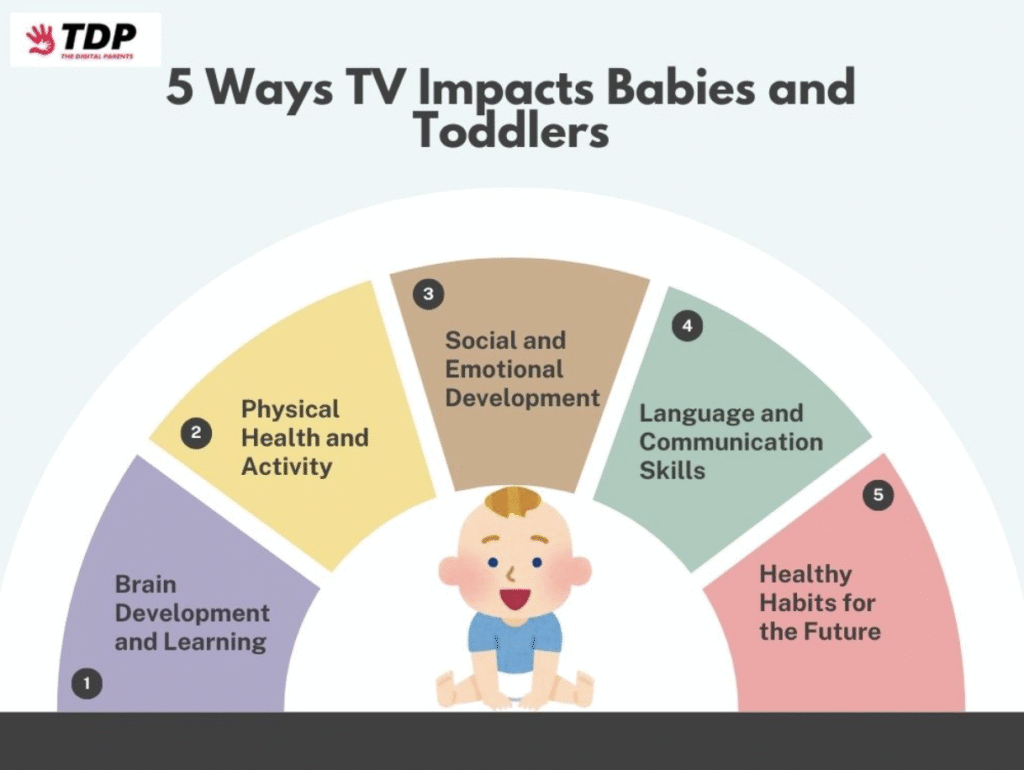Your baby may not know the alphabet yet, but somehow they already recognize the Netflix logo. Coincidence? Not really. In spite of the fact that watching television is a usual activity of the family, no attention is often paid to its influence on infants and young children. The brains of children are still in their formative years, so what or how much they observe can affect the way they grow.
Parents will make improved decisions when they have knowledge of the pros and cons of screen time. The Digital Parents expert guidance can help families to introduce healthy TV habits and decide on a balance in such a way.
The question is, how much TV is healthy for babies and toddlers?

Why It’s Important to Limit Young Children’s Screen Time
The early years are crucial for the development of the brain, language, and social skills. At this young age, excessive screen time can hinder natural development by depriving kids of necessary time for meaningful family time, a healthy dose of active play, and actual real-world learning. Parents can make sure that children get technology for its positive benefits without losing sight of essential skills that will shape their lives ahead by setting healthy digital ground rules. At the same time, all the main points are detailed below.
1. Brain Development and Learning
The brains of children grow rapidly during the early stages of life, leading to them being highly sensitive to the environment. Excessive screen-time can complicate problem-solving skills as well as actual practice, which can be a hindrance to critical development in the cognitive domain. The memory, attention span, and reasoning abilities, which are acquired as a result of face-to-face communication, cannot be fully substituted by digital devices.
- Compared to passive screen viewing, active play fosters stronger neural connections.
- Face-to-face interactions help children acquire language more quickly.
- Overuse of screens can impair one’s ability to concentrate and focus.
Tip: Replacing background TV with interactive games, storytelling, or imaginative play can help improve brain development.
2. Physical Health and Activity
Jobs that include sitting all the time due to excessive use of screens cause childhood obesity, poor posture, and sleep problems. Active physical play refreshes the mood and improves vitality, as well as facilitates the increase in muscular and skeletal development.
- Excessive screen time causes a reduction in daily physical activity.
- Spending much time in a seated position causes strain to the eyes and poor posture.
- Less screen time in the evenings is linked with improved quality of sleep.
Tip: Encourage outdoor activities, such as jogging, bicycling, or baseball games, instead of electronic activities.
3. Social and Emotional Development
Direct social interaction enables children to gain emotional awareness, empathy and cooperation. The inability to maximize these opportunities due to the excessive use of screen time deprives them of developing the ability to develop appropriate interpersonal and communicative skills. Family relationships and socialization with peers establish a more balanced environment in terms of emotional formation.
- Play in real life fosters cooperation, patience, and sharing.
- An excessive amount of screen time can lead to mood swings or irritability.
- In-person interactions foster self-expression and confidence.
Tip: To better family relationships, make screen-free times of the day: for instance, before bed or during meals.
4. Language and Communication Skills.
Young children learn best by speaking among themselves, listening and conversing with other people. The opportunities of these ways are limited by too much time spent in front of the screen, which slows the process of building vocabulary and conversational abilities. Good language proficiency can be trained during the parent-child interaction better as compared to educational apps or videos.
- Stronger vocabulary is developed through reading aloud and telling stories.
- The advantages of interactive dialogue cannot be matched by screens.
- Language delays are often related to high screen time.
Tip: Set aside time each day to read books and promote free-flowing discussions.
5. Healthy Habits for the Future
Early development of balanced screen habits helps kids make healthier decisions as they get older. Teaching how to control oneself, be moderate, and the significance of not being online all form a basis of long-term wellbeing. These behaviours can be critical to parents as important role models. Children will pick up digital habits in the future due to their early practices.
- Future digital habits are influenced by early routines.
- Over-reliance on screens is avoided with sound boundaries.
- The media preferences and behaviour of parents are emulated by children.
Tip: Establish unambiguous screen-time guidelines and engage in digital equanimity as a family.
Encourage Your Parenting Adventure
It can be difficult to strike a balance between screen time and healthy activities, and many parents worry about how much TV is too much. It is a natural desire to want your child to be the best, but what choices are most likely to support their growth is not always obvious.
This is where direction is important. Here at The Digital Parents, we offer resources, easy-to-follow guidelines, and reliable advice to help you raise contented, healthy kids in the digital age. To view additional parenting resources catered to your family’s requirements, stop by our website today.
Frequently Asked Questions
How much television is appropriate for a two-year-old each day?
For two-year-olds, experts advise limiting screen time to no more than one hour per day of excellent, developmentally appropriate programming. Toddlers learn to comprehend and apply what they see in real life when they watch together.
What occurs if young children watch too much television?
Too much TV can shorten attention spans, delay speech, and limit opportunities for active play. If kids watch before bed, it could also have an impact on their quality of sleep. Social skills and physical activity may eventually be impaired by overuse of screens. Toddlers who have healthy boundaries are more likely to balance screen time with movement, creativity, and in-person interactions.
How can I limit the amount of time my toddler spends watching TV?
Set a time limit and regular screen time, make sure to take up playtime every day, and give interesting alternatives such as reading, drawing, or outdoor activity. Leave the background TV off so as not to be distracted. Although it is inadvisable to have periods of screen time, having the screen time at fixed times is a way of creating structure.







